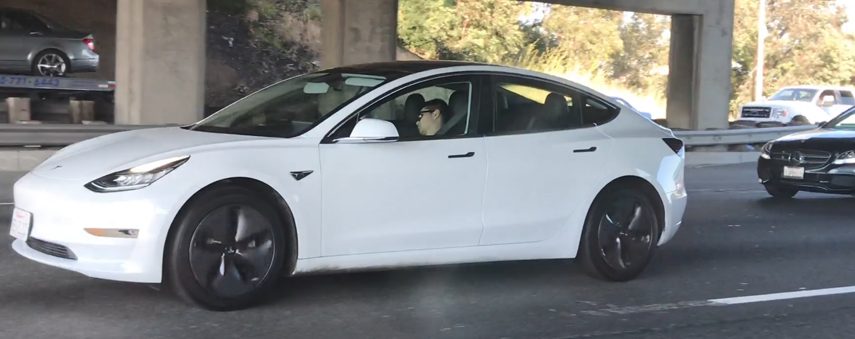How dangerous is it to fall asleep driving an autonomous vehicle?

Credit: Reddit
Could a Tesla drive you while you sleep? After reports of drivers falling asleep in autonomous vehicles, we spoke to roads expert Charlie Henderson.
Falling asleep at the wheel can kill. Does the same apply for an autonomous vehicle? After all, artificial intelligence should be able to drive for you.
It’s a question that has been associated with driverless cars since they were first trialled in the 1950s. Exactly how autonomous are autonomous vehicles? These days, Tesla drivers are challenging the hypothesis.
Recently, there have been reports of drivers falling asleep at the wheel of Tesla cars. Whilst the car is set to autopilot, it’s understandable to lose a little of the focus that driving requires. Autonomous cars are designed to do most of the work for us but sleeping at the wheel of a Tesla is taking that to an extreme.
Despite this, Tesla currently sells a “Full Self Driving” (FSD) option. CEO Elon Musk has claimed that it is “financially insane to buy something other than a Tesla” thanks to his company’s advanced driving capabilities. The brand isn’t far away from releasing a car without pedals if rumours are to be believed.
So is all this talk of staying awake whilst driving just a guideline? Are autonomous vehicles capable of such feats that we don’t even need to be conscious to enjoy them? Perhaps the law is outdated?
How much of the work does an autonomous vehicle do?
“A commonly held misconception is that Tesla vehicles are self-driving,” says Charlie Henderson, a roads expert at PA Consulting. He advises clients around the challenges and opportunities of transitioning to new technologies in the transport sector.
“Their [Tesla’s] ‘Autopilot’ capability does allow them in certain conditions to steer, accelerate and brake within a marked lane,” Charlie says. “However, the manufacturers are clear to highlight that this capability does not make the vehicle self-driving and therefore still requires active driver supervision. Falling asleep at the wheel – in direct contradiction of the manufacturer’s guidance – is therefore extremely dangerous.”
While significant technological advances have been made, PA’s research suggests that it will be many years – possibly ten – before fully autonomous vehicles are commonplace on our roads.
Charlie Henderson, PA Consulting
Most self-driving cars rely on an internal map similar to radar. Vehicles create a picture of the world around them by using sensors and laser beams which hit objects around them to determine their position and distance.
A lot of cars these days have some level of autonomous control. That may be via cruise control or automatic braking. These are subtle and simple technologies that can assist a driver with their journey but they are nowhere near the level of sophistication that Tesla offers with their autonomous vehicles.
A Tesla car processes the inputs of its sensors around it. The software then plots a path before relaying instructions to the individual aspects of a vehicle that controls movement: the accelerator, steering, clutch and the brakes. Artificial intelligence comes into play too. The car needs to know when to avoid obstacles, how to learn traffic rules and what to distinguish as a threat on the road. Machine learning is particularly proficient at taking this data, analysing the patterns of what it sees and applying it to the world around it.
However, it is almost impossible to eliminate uncertainty. As Charlie says, driver supervision is integral.
What does the future of the autonomous vehicle look like?
Elon Musk is an ambitious man. He sent a Tesla into space, after all. Though the idea of cars without pedals might just be around the corner, the reality is perhaps a little further away.
Autonomous vehicles may well be used without passengers at all but there are considerably fewer risks when cars don’t carry life. In order for autonomous vehicles to safely carry passengers however, Vehicle-to-Everything (V2X) communication needs to develop. Roads need to be equipped with IoT technology in order to receive and process information, before feeding it back to cars on the road. The technology needs to evolve to the point where everyone is safe: otherwise, no one is safe.

The conversation surrounding driverless cars needs to be about more than just technology though, according to Charlie Henderson.
“The development of autonomous vehicles is a multi-dimensional challenge involving technological, legislative, behavioural and business changes,” Charlie says.
“While significant technological advances have been made, PA’s research suggests that it will be many years – possibly ten – before fully autonomous vehicles are commonplace on our roads. With over 37 million vehicles in the UK, it will take many decades before nothing but autonomous cars are on the road.”
People will drive change
Ultimately, Charlie isn’t sure that fully autonomous roads would be embraced by drivers just yet. “It is not clear that this is something that the public actually want,” he says.
This is perhaps why it’s predicted that driverless cars will be picked up by businesses before they’re more heavily implemented by consumers.
Tesla is selling fewer cars this year than they did in 2018. How much of that is down to the bad publicity over sleeping drivers? It’s unclear for now but ordinary drivers will determine how quickly we move into an autonomous future.
